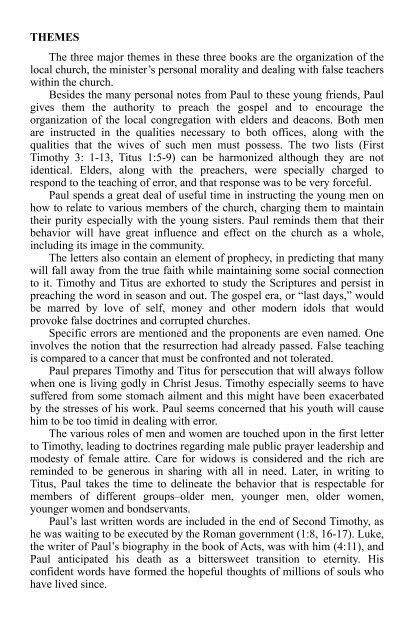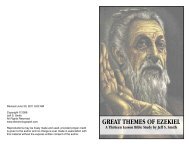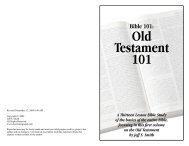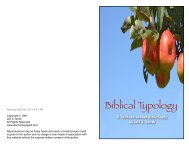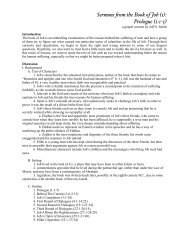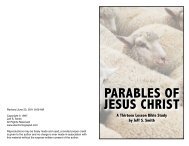New Testament Study Guides - ElectronicGospel
New Testament Study Guides - ElectronicGospel
New Testament Study Guides - ElectronicGospel
Create successful ePaper yourself
Turn your PDF publications into a flip-book with our unique Google optimized e-Paper software.
THEMES<br />
The three major themes in these three books are the organization of the<br />
local church, the minister’s personal morality and dealing with false teachers<br />
within the church.<br />
Besides the many personal notes from Paul to these young friends, Paul<br />
gives them the authority to preach the gospel and to encourage the<br />
organization of the local congregation with elders and deacons. Both men<br />
are instructed in the qualities necessary to both offices, along with the<br />
qualities that the wives of such men must possess. The two lists (First<br />
Timothy 3: 1-13, Titus 1:5-9) can be harmonized although they are not<br />
identical. Elders, along with the preachers, were specially charged to<br />
respond to the teaching of error, and that response was to be very forceful.<br />
Paul spends a great deal of useful time in instructing the young men on<br />
how to relate to various members of the church, charging them to maintain<br />
their purity especially with the young sisters. Paul reminds them that their<br />
behavior will have great influence and effect on the church as a whole,<br />
including its image in the community.<br />
The letters also contain an element of prophecy, in predicting that many<br />
will fall away from the true faith while maintaining some social connection<br />
to it. Timothy and Titus are exhorted to study the Scriptures and persist in<br />
preaching the word in season and out. The gospel era, or “last days,” would<br />
be marred by love of self, money and other modern idols that would<br />
provoke false doctrines and corrupted churches.<br />
Specific errors are mentioned and the proponents are even named. One<br />
involves the notion that the resurrection had already passed. False teaching<br />
is compared to a cancer that must be confronted and not tolerated.<br />
Paul prepares Timothy and Titus for persecution that will always follow<br />
when one is living godly in Christ Jesus. Timothy especially seems to have<br />
suffered from some stomach ailment and this might have been exacerbated<br />
by the stresses of his work. Paul seems concerned that his youth will cause<br />
him to be too timid in dealing with error.<br />
The various roles of men and women are touched upon in the first letter<br />
to Timothy, leading to doctrines regarding male public prayer leadership and<br />
modesty of female attire. Care for widows is considered and the rich are<br />
reminded to be generous in sharing with all in need. Later, in writing to<br />
Titus, Paul takes the time to delineate the behavior that is respectable for<br />
members of different groups–older men, younger men, older women,<br />
younger women and bondservants.<br />
Paul’s last written words are included in the end of Second Timothy, as<br />
he was waiting to be executed by the Roman government (1:8, 16-17). Luke,<br />
the writer of Paul’s biography in the book of Acts, was with him (4:11), and<br />
Paul anticipated his death as a bittersweet transition to eternity. His<br />
confident words have formed the hopeful thoughts of millions of souls who<br />
have lived since.


